Lincoln
 for an intense scene of war violence, some images of carnage and brief strong language.
for an intense scene of war violence, some images of carnage and brief strong language.
Reviewed by: Casey Scharven
CONTRIBUTOR
| Moral Rating: | Average |
| Moviemaking Quality: |
|
| Primary Audience: | Adults Teens |
| Genre: | Biography History War Drama Adaptation |
| Length: | 2 hr. 20 min. |
| Year of Release: | 2012 |
| USA Release: |
November 9, 2012 (limited—11 theaters) November 16, 2012 (limited) DVD: March 26, 2013 |
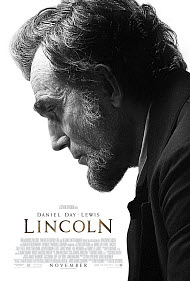

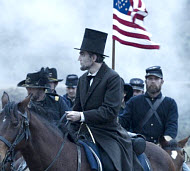
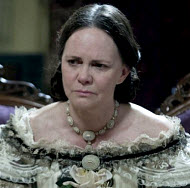
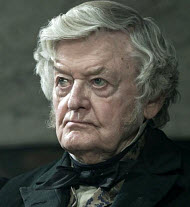
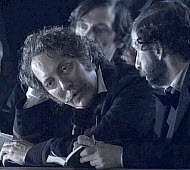
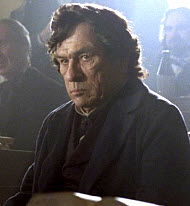

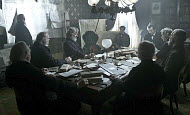
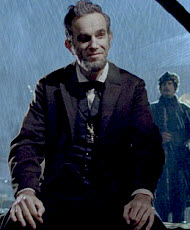
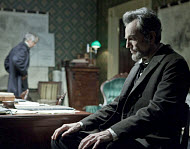
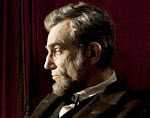
movie review: “Gettysburg” (1993)
movie review: “Gods and Generals” (2003)
movie review: The Conspirator (2011)
moral courage
team conflict / reconciling conflicting personalities, cultural conflicts and political factions to achieve success for greater good
Book: Team of Rivals: The Political Genius of Abraham Lincoln by Doris Kearns Goodwin
ethical dilemma
war in the Bible
What is the Biblical perspective on war? Answer
Does the Bible condone slavery? Answer
FOUNDING FATHERS AND SLAVERY—Were America’s Founding Fathers racists, pro-slavery, and hypocrites? Answer
U.S. abolition/abolishment of slavery
emancipation of slaves
family conflict
death of a child
mental illness
assassination
| Featuring |
|---|
|
Joseph Gordon-Levitt … Robert Todd Lincoln Daniel Day-Lewis … Abraham Lincoln Tommy Lee Jones … Thaddeus Stevens Jackie Earle Haley … Alexander Stephens Sally Field … Mary Todd Lincoln David Strathairn … Secretary of State William Seward Hal Holbrook … Francis Preston Blair Tim Blake Nelson … Richard Schell Adam Driver … Samuel Beckwith Jared Harris … Ulysses S. Grant David Oyelowo … Ira Clark Walton Goggins … Wells A. Hutchins Bill Camp … Mr. Jolly John Hawkes … Robert Latham See all » |
| Director |
|
Steven Spielberg |
| Producer |
|
DreamWorks Pictures Twentieth Century Fox Film Corporation See all » |
| Distributor |
“…and that government of the people, by the people, for the people, shall not perish from the Earth.”
Hearing a movie is directed by Steven Spielberg is often a reason many people pause and consider seeing that movie. His record as a writer, producer, and director places him as one of most influential filmmakers in cinema history. Involved in many of the most important AND popular films in the past 40 years (“Jaws,” “Close Encounters of the Third Kind,” “Indiana Jones and the Raiders of the Lost Ark,” “Back to the Future,” “Schindler's List,” “Jurassic Park,” “Amistad,” “Saving Private Ryan,” “E.T.: The Extra-Terrestrial,” and many, many others), his latest production, “Lincoln” will be considered as an addition to the list of Spielberg classics.
The movie, which Mr. Spielberg based on the book Team of Rivals, by Doris Kearns Goodwin, is focused on President Lincoln’s efforts to convince the House of Representatives to pass the proposed 13th Amendment (to abolish slavery) prior to the end of the war with the Southern states. The movie trailers give only a hint as to the powerful scenes which show the political struggle to address the future of the United States; its relationship to slavery and to those who would be freed by the 13th Amendment. The movie opens with a poignant scene where it is apparent that Lincoln’s Gettysburg Address has impacted both white and colored soldiers. As part of the effort to pass the 13th Amendment in the House of Representatives, the movie portrays the question of how to address the Confederacy’s peace overtures, the timing of the war’s end, and the vote on the Amendment. Many politicians believed that passage of the Amendment would cause the continuation of the war, as the South would fight on; President Lincoln wanted the Amendment passed so there could be no possibility of slavery continuing after the Southern states rejoined the Union.
When you were little, do you remember imagining a scene from a book? Mr. Spielberg has a knack for bringing stories to the cinema screen that we might have only been able to imagine, and in “Lincoln”, he has done so again. If you ever wondered what Abraham Lincoln really looked like; how he walked, and maybe even how he talked (yes, Daniel Day-Lewis researched contemporary accounts of how Lincoln spoke), you will be enchanted. If you ever wondered what a Civil War battle might have looked like, then you will have a good idea of it by the end of the movie. Spielberg has brought the era, the city, the men and women, the politics, and the war to the big screen in a hyper-realistic manner reminiscent of “Saving Private Ryan”. He shows the complicated tapestry President Lincoln had to weave to keep the Union together as the war reached the final days, while trying to prepare for the eventual reconciliation of the Southern states. You see the weariness on General Ulysses Grant’s face; see the bloody aftermath of battle in a Union hospital; and see the struggles of many people as they thought about what freeing the slaves would truly mean to the nation.
Daniel Day-Lewis is incredible in his portrayal of President Lincoln. One of the greatest compliments to an actor is that when you go to a film, you do not “see” the actor, but the character. In this movie, you do not see Daniel Day-Lewis, two-time Academy Award winner; you see President Abraham Lincoln. His mannerisms, how he walked, held his hands, how he spoke were all researched and performed in great detail. You see a man dealing with the weight of war, and with the knowledge of the cost in human lives. A man who was wounded by the death of his son, and who struggles to deal with his wife, who has been even more grievously wounded by their son’s death. A man who understood the true genesis of the war, and his unique position to end the abomination of slavery. You hear the stories President Lincoln used to tell. Lewis plays President Lincoln as a real person, not the sanitized “saint” we so often read about.
Sally Field is excellent in the portrayal of Mary Todd Lincoln, who has often been vilified in books by her erratic actions. David Strathairn is exceptional as Secretary of State William Seward, who is often only remembered today for “Seward’s Folly” and the purchase of Alaska. Mr. Strathairn has an impressive resume of work (see his turn as Edward R. Murrow in “Good Night, and Good Luck”) and is a strong supporting character. Tommy Lee Jones could have been accused of playing Representative Thaddeus Stevens “over the top,” but when you research Representative Stevens, you find that Mr. Jones’ portrayal may not have been far from the mark. His ill-tempered, quick-witted, sarcastic, and eloquent persona is perfect for an actor like Jones. Other cast members are excellent, with my particular favorites being Bruce McGill as Secretary of War Stanton, and Jackie Earle Haley as Alexander Stephens.
Unlike many movies in recent years, “Lincoln” does not fall into the trap of overwhelming special effects, or a soundtrack that detracts from the movie experience instead of bringing the audience closer to the story. The visual imagery in the movie is breathtaking; the soundtrack works well to bring the story to life. The acting performances are often understated, and often the movie shows the power of speech and the raw exercise of power in politics. The President’s assassination is handled in a subdued manner (no graphic scenes of the shooting or death).
So, what to make of the movie from a Christian perspective?
The movie is rated PG-13, and shows violent battle scenes, but not anywhere on par with the ferocity or scale of the opening scenes of “Saving Private Ryan”. A Christian is saddened to realize that war is a reflection of the sinful state of man. The movie portrays the love the Lincolns’ had for their sons Willie, Tad, and Robert, to include the grief shown by both parents over the death of Willie. It shows the inability of Abraham and Robert to engage in a close relationship; these are all emotions and areas which we see today in our families. Many Christians struggle when a child is lost, and can find themselves far from the LORD during this time. President Lincoln’s faith is not overtly on display, and historians have differences on what the President’s true views were on Christianity. The movie shows the conflict of slavery in the mid-19th century, and how, even in the North, many white people were simply unable to cross the line and accept a colored person as an equal. They could believe that slavery was wrong, and even a sin; but they could not accept a colored person having the right to own property, or to vote.
The Bible tells us that all men are sinful and are in need of a Savior. The movie shows how patronage was used (legal in 1865) to procure votes from Democratic Representatives during the lame duck Congress. Patronage was the practice of a politician rewarding supporters with government jobs, and some might argue that patronage was simply a tool used in the mid-19th century to “get things done”. I would ask simply if you would believe Jesus would approve of providing a position to someone not based on who they were, but what votes or funds they brought to a political party or campaign.
The movie portrays Representative Stephens, a long-time supporter of full equality for colored people, speaking to the House of Representatives and lying by stating that equality of the races was not his view but only equality before the law. He did so out of political expediency, knowing that if the newspapers reported his radical idea of racial equality, the Amendment might fail during the House vote. After the vote, a colleague approaches Stevens to say they were nauseated by his lie; Stevens replies (in essence) that means justified the end result. This showed that Stevens was not ready to trust the LORD with the vote, but felt he had to lie to ensure that the Amendment was passed in the House of Representatives. After the vote, Representative Stephens is also shown going home and getting into bed with his colored housekeeper. It is clear that they are not married, and the Bible clearly states this is adultery.
I had the most trouble with the language. I was particularly sensitive to the use of the LORD’s name, but there is also a lot of vulgarity, with numerous f***, son of a bi***, da**, cr**, pi**, sh**, he** throughout the movie. There were also uses of the name of Jesus in a profane manner. Mostly, I was very disappointed that the were over 10 uses of “g** d***”. I usually draw the line at the use of the LORD’s name, but have to admit that any movie that strives to be historically accurate is going to be portraying the life of a sinner. Sinners often use profanity, and often take the LORD’s name in vain. The philosophical battle of truthfully bringing a historical person to the screen is in conflict with the command that no one should take the name of the LORD in vain.
Ultimately, “Lincoln” shows us the battle our nation fought in 1865. Many would consider the battle to be the one fought by the Northern and Southern armies. I would submit that the battle most eloquently and powerfully brought to the screen in “Lincoln” is the battle over the worth of an enslaved people, and the struggle of a nation to come to terms with the question of equality between the races.
As Christians, we are called to salt and light to a fallen world, and that we are to serve the lowest of the low. We are called to love one another, as Christ loved us. This movie is a reminder of the depths of sin we can fall into, and the terrible consequences of that sin.
Violence: Moderate to heavy / Profanity: Heavy / Sex/Nudity: Mild
See list of Relevant Issues—questions-and-answers.


Moral rating: Average / Moviemaking quality: 4
The costume design and interior work is gorgeous, as is the cinematography. Spielberg makes some interesting directing choices that work in unexpected ways, sometimes borrowing from famous paintings and, at other times, tugging on our heartstrings in unanticipated ways. I regret that there’s so much abuse of God’s name, but in every other way for me it’s the best movie of the year.
Moral rating: Better than Average / Moviemaking quality: 4½
Now to what I think of the movie. “Lincoln” is a well-acted, well-directed and more or less well-written depiction of the days in January and several days of April 1865 where President Lincoln struggles with his divided Cabinet to get the Thirteenth Amendment ratified. The opening scene is all the glimpse we get of the Civil War. The remainder of the movie is straight-up talk. Don’t let that stop you from experiencing this monumental motion picture, though. Daniel Day-Lewis, Sally Field and Tommy Lee Jones play Abraham Lincoln, Mary Todd Lincoln and Thaddeus Stevens very well. I think we can expect Academy Award nominations for all three of them come Oscar® time. Other actors who give good performances in the limited screen time they have are Gloria Reuben (ER) as Elizabeth Keckley, confidant and dress-maker to Mary Todd Lincoln, Jared Harris (“Sherlock Holmes: A Game Of Shadows”) as General Ulysses S. Grant, Joseph Gordon-Levitt (“Angels In The Outfield,” “The Dark Knight Rises”) as Robert Todd Lincoln, S. Epatha Merkenson as Thaddeus Stevens” housekeeper, James Spader as W. N. Bilbo, David Straithairn as Secretary Of State William Seward and Hal Holbrook as Senator Preston Blair. See all »
Moral rating: Average / Moviemaking quality: 5
Still, this film solely relies on its dialog, and it is very well written. The acting is phenomenal, Spielberg did a great job directing, and there was some great cinematography and editing as well. I do advise however that this film not be viewed by anyone under the age of 14 due to the subject matter and of course, the foul language. It would’ve been great to see more of Lincoln’s faith displayed on screen, but at least there were still some spiritual references which was nice.
I felt that a little more could’ve been told about Lincoln’s legacy though. This is why I knocked the film down half a star. I felt that there should have been more discussion about slavery itself and the ending felt a little too rushed. I understand that Lincoln’s death wasn’t the point of the movie but the ending seemed just a little too sudden even though it did end on a great uplifting note. All that said, this is a great historical film which is a step above Spielberg’s “War Horse” and is sure to be an American classic for generations to come. Although Lincoln didn’t blow me away, I was still satisfied with this historical drama. “Argo,” “The Master,” and “Les Miserables” may give “Lincoln” a run for its money come awards season.
Moral rating: Average / Moviemaking quality: 4½
Moral rating: Better than Average / Moviemaking quality: 4½
Moral rating: Offensive / Moviemaking quality: 4
Moral rating: Average / Moviemaking quality: 4½
Moral rating: Better than Average / Moviemaking quality: 4
Moral rating: Better than Average / Moviemaking quality: 5
Moral rating: Extremely Offensive / Moviemaking quality: 3
2. You say that “Sinners often use profanity…” The way I read that you are insinuating that Christians don’t use profanity and are “not sinners.” Let’s face it, many non-Christians may read your review and find this statement hypocritical and naive because of the imperfect Christians they know. I would like to see you present a more fair and accurate view of Christians who, as we all know, are sinners saved only by the grace of God. Your reviews could be a tool through which God can draw the unsaved closer to Him—my fear is that statements like the one above may do just the opposite. All in all, I do appreciate your review and felt better prepared for the movie because of it. The movie took us into that time and place very accurately and did not disappoint.
Moral rating: Better than Average / Moviemaking quality: 5
Now, on to the things I loved about this movie. First of all, I’m a history buff. So, this movie was right up my alley. Secondly, I have loved Steven Spielberg as a director going all the way back to E. T. The man knows how to get great performances out of his actors. Speaking of great performances, there are some AMAZING ones on display here. The best one is Daniel Day-Lewis, of course, portraying Lincoln. He not only plays Lincoln… you almost get the feeling you’re staring into the face of the Great Emancipator. And, you really get involved in his struggle to end the war and abolish slavery. See all »
Moral rating: Average / Moviemaking quality: 5
This is a somehow innocent yet primitive era. There are no TV cameras following people around, and in many scenes Lincoln seems ignored as he rides around. There is no Fox News, but Congressmen hurl insults at each other. Sometimes there is inspiring rhetoric, other times foul language. Yet important work is done for good or bad reasons, by people who seemingly could not otherwise agree.
This film inspires different reactions based on peoples” expectations. Lincoln like Biblical figures like Abraham, Jacob, David and Solomon are often honored from a distance in ways that don’t hold up on close examination. What would Jesus do in these situations, and more importantly what would he have us do? In particular how do the ends justify the means? Is politics like a sausage that we don’t want to see made, and when is it for good rather than bad? This film should inspire thoughts about that.
Moral rating: Average / Moviemaking quality: 4½
The music score was hardly noticeable, which was a shame, being that the music was by John Williams. The movie did not touch my heart in any way (and no music to help in this area), it was just a historical movie with good acting. For historical buffs, like me, it was a good film for Hollywood to make. I did not like to see Lincoln cuss and use the Lord’s name in vain. Did Lincoln do that in real life? I don’t think there is any historical proof that Lincoln did. Thanks Spielberg, the liberal bone in you came out there. The movie kept my interest but I felt no passion that hit me.
Moral rating: Average / Moviemaking quality: 4½
Moral rating: Extremely Offensive / Moviemaking quality: 4
Moral rating: Good / Moviemaking quality: 3
From a standpoint of personal morality, Lincoln had a filthy vocabulary, as shown by his habit of telling profane, vulgar jokes to amuse his cronies and other men, some of whom were scandalized by his obscenity. He had a callous disregard for suffering caused by his war. In March 1865, at City Point, Virginia, Lincoln met with Grant and Sherman; he asked to hear stories about how Sherman’s “bummers” vandalized churches and raped, pillaged and murdered unarmed civilians in Georgia and South Carolina. Lincoln guffawed when he heard these stories. This disturbing scene was recorded in Sherman’s memoirs and by U.S. Adm. David Porter who was an eyewitness to the meeting.See all »
Moral rating: Extremely Offensive / Moviemaking quality: none
For myself, it is necessary to remember the words in Philippians regarding “keeping our thoughts on that which is holy, pure and lovely”. I know it is very hard to find wholesome movies that we can even watch and enjoy today.
Moral rating: Extremely Offensive / Moviemaking quality: 3½
The south was in a brutal cycle, and as Tocqueville noted in “Democracy in America” they *couldn't* just free the slaves. It was far too complicated an issue for that. According to pretty much every credible source around, the slave trade could not have existed the way it did if there wasn’t a huge amount of Africans who captured and sold slaves as a business. Slavers weren’t raiding poor villages for slaves—they were hitting up the local tribes, who acted as wholesalers. Sad fact that people ignore.See all »
Moral rating: Offensive / Moviemaking quality: 3½
Moral rating: / Moviemaking quality:
PLEASE share your observations and insights to be posted here.

Yet, sadly, the director, Steven Spielberg has saw it fit to modernize the conversations and as thus filled the dialog with at least 33 profanities/swear words. This is rather unfortunate as the foul language detracts from the movie and in every case was unnecessary. The Civil War period was a different time, and the conversation between folks then was NOT tainted with profanity as the people tended to be more respectful and religious in their speech. I am not sure why Spielberg tends to taint his films (those for older audiences) with this sort of unnecessary and non-historic dialog (this is true also of his “Saving Private Ryan,” where the characters are diarrhea mouths, something rather difficult to find in average folks even in the 1940s). The movie would be much improved had they not added in the unnecessary and profuse foul-language.
For more accurate period films of the Civil War, I recommend “Gettysburg” and “Gods and Generals.”
My Ratings: Moral rating: Better than Average / Moviemaking quality: 4